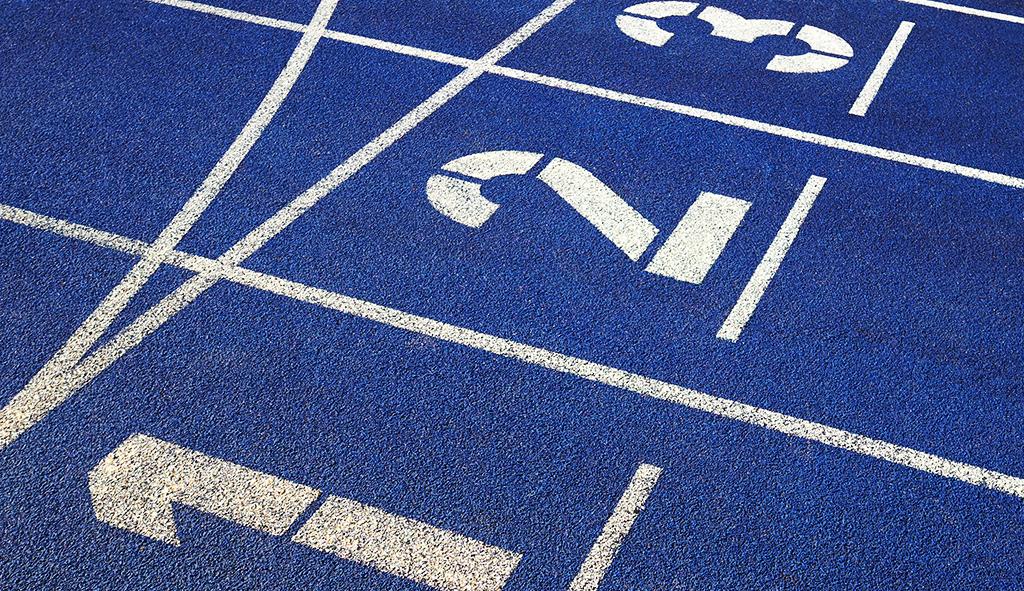At a glance: our main research interests and current projects at the Chair of Sport Psychology.
The aim of this Erasmus+ funded project is to develop a virtual reality programme for anti-doping education. The project is coordinated by Prof. Vassilis Barkoukis from the Aristotle University of Thessaloniki (Greece) and will be conducted in cooperation with our project partners at Aalborg Universitet (Denmark), the European Network of Sport Education (Austria), Curtin University of Technology (Australia), Sheffield Hallam University (UK), and UNEFS Universitatea Nationala de Educatie Fizica si Sport Bucuresti (Romania).
Contact
Development and Evaluation of a Values-based Doping Prevention Programme for Young Athletes
The purpose of this study is the development, implementation, and evaluation of an evidence-based psychosocial intervention, aiming to reduce doping intentions in young elite athletes. The intervention program focuses both on personal and environmental values-based variables associated with doping. Funding: Federal Institute of Sport Science (ZMVI4-070301/18-19).
Visit our project website.
Contact
From Research to Application: An Evidence-Based Psychosocial Intervention for Doping Prevention in Young Athletes
The aim of this project is to develop a new doping prevention strategy for young athletes which is based on the development and strengthening of moral skills. The project is being conducted in collaboration with Maria Kavussanu (University of Birmingham, Prinicipal Investigator) and Antonis Hatzigeorgiadis (University of Thessaly, Co-Investigator). Funding: WADA.
Contact
Developing a Scenario-Based Educational Module for Values-Based Anti-doping
The project aims to assess values associated with competitive sport and how these values conflict with 'spirit of sport' values. A goal of the project is to develop an integrated conceptual framework for values-based anti-doping training for athletes and their entourages. The SMART project is being conducted in collaboration with Andrea Petroczi (Kingston University, Principal Investigator) and further partners in Greece, Italy and Russia. Funding: IOC.
Contact
Regular physical activity is associated with several physiological and psychological benefits, such as weight loss, body shaping, relaxation or enhanced health and well-being; it is also indicated in the primary prevention of chronic diseases and obesity. However, competitive sport also comprises negative aspects, such as performance pressure, public and media scrutiny, cultural and social claims, all of which can have negative impacts on athletes' mental and physiological health (for an overview see Reardon et al., 2019; Rice, Purcell, De Silva, Mawren, McGorry, & Parker, 2016). Aside from expected physiological risks of competitive sports, such as risk of injury or overtraining, increasing numbers of male and female athletes with symptoms of disordered eating or eating disorder are observed (Bratland-Sanda & Sundgot-Borgen, 2013; Byrne & McLean, 2001; Conviser, Tierney, & Nickols, 2018). In this study we investigate the relationship of symptoms of disordered eating and/or eating disorder symptoms with several psycho-social aspects. In our investigation, participants anonymously completed the following paper-and-pencil assessments during their annual sport capability test: the German version of Eating Disorder Examination Questionnaire for children short form (ChEDE-Q8, Hilbert, 2016; Kliem et al., 2017), the German version of the ATHLETE questionnaire (Hinton & Kubas, 2005; Thiemann et al., 2014) and the German version of the Volitional Components Questionnaire (VCQ; Elbe, Szymanski, & Beckmann, 2005; Kuhl & Fuhrmann, 1998). In addition to the psychometric questionnaires, socio-demographic aspects (i.e., age, gender, body height, body weight, sports, training hours, years of competition, competition level), eating behaviors (i.e., meals and snacks per day, strategies to reduce weight), media usage and related content were assessed. Inclusion criteria for participants were (at least) 12 years of age and participation in a competitive sport activity at a minimum of D-squad level.
Contact
While regular physiological is associated with physiological risks such as injury or overtraining, particularly excessive exercise can have psychological side effects and become obsessive. This obsessiveness is often associated with symptoms of addiction (i.e., reduction of other activities, lack of control, withdrawal symptoms). However, the underlying processes of developing an exercise addiction are poorly understood. In addition to the physiological approach, there are several psychological and socio-theoretical models that focus on personal and situational factors. The aim of this research is to explore the role of bio-psycho-social aspects and their influence on the etiology and symptoms of exercise addiction.
Contact
Behavior change in physical activity and diet
The project consists of various studies investigating behavioral, motivational and volitional aspects of behavior change. The studies aim to shed light on behavioral conditions regarding the use and effect of strategies and the development of habitual behavior. The aspects of frequency, temporal consequence as well as well-being and mood are also examined. With regard to the strategies, it is interesting how often these strategies are used in everyday life and how efficient their application is. In a habit formations study for example participants chose a health-oriented behavior and practice is for 12 weeks. The results contribute to a better understanding of the process of behavior change.
Contact
Two-stage prevention project to promote mental health in young elite athletes
The aim of this project is to promote mental health of young elite athletes. With the development, evaluation and implementation of a two-stage prevention program, depressive symptoms in young athletes should be prevented, recognized at an early stage and treated psychotherapeutically if present. The two-stage prevention program consists of universal prevention (stage 1) and indicated prevention (stage 2).
In stage 1, the athletes are given basic knowledge on depression-related topics such as stress and stress management, communication and interaction as well as physiological factors. Stage 2 aims to teach strategies that enable to regulate stress and emotions more effectively and strengthen social skills, self-esteem and a non-sport-related identity. The project is carried out together with colleagues from the Clinical Child and Adolenscent Psychology at Leipzig University.
Contact
In cooperation with the State Sports Association of Saxony (Landessportbund), we are pursuing a coach qualification through regular and professionally guided collegial case advice (supervision), especially focusing on communication, pedagogy/didactics and psychology. It is intended to educate and strengthen coaches confidence in their daily work. The aim is the development and implementation of annually binding supervision as well as optional additional coaching offers in small groups (10-12 people) for the full-time, state-funded coaches in the professional /competitive context, carried out or organized by the State Sports Association of Saxony.
The aim of the project is to create security in the coach-athlete interaction, to sharpen the understanding of roles, to promote the athletes’ maturity, to prevent conflicts, to reduce physiological and psychological stressful situations and thus at the same time contribute to the psychological health of the actors. With the help of regular supervision, a new quality of further training is to be developed especially for full-time coaches working in competitive sports, which specifically and continuously reflects their own coach behavior on a micro and macro level. For this purpose, the coaches of different sports are able to discuss together in small groups and recognize long-term approaches to changing their own behavior.
The project will be implemented in two stages:
1) 10 to 12 three-hour online workshops and
2) 3 intensive workshops.
Both phases are evaluated both qualitatively and quantitatively.
Contact
Sport participation has been recognized as an important socialising agent. Further, the sport environment is considered a suitable setting for the development of social and moral values, particularly for youths. Therefore, it can be argued that participation in sport may reinforce understanding of, and respect for, cultural diversity and foster the integration of migrants. This project investigates the conditions under which sport can provide a common ground for the cultivation of cultural integration. Funding: FEPSAC – The European Federation of Sport Psychology – since 2007.
Contact
Effects of Interest on Affective-Motivational Determinants in Different Sport Settings
Interest can be defined as a specific form of motivation that influences perception and behaviour in different sport settings. Recent research has underlined the necessity of investigating the relationship of, and effects between, interest and affective-motivational determinants. The aim of this project is to analyse the effects of interest and intrinsic motivation on affective perceptions and to develop practical implications.
Contact
From a sport psychological perspective, school pupils' affective and emotional perception plays a crucial role in physical education (PE). However, it remains unclear which teaching methods and strategies influence affective-emotional perception in PE. The aim of this project is to analyse – from the perspective of pupils – emotions and effects of identified triggers in PE.
Contact
Emotional regulation in sports is often embedded in social and interactive contexts. This research focus asks questions regarding the elicitation, manifestation, and regulation of-especially-social emotions (i.e., pride, empathy) as psychological resources for athletes, students, coaches, and physical educators.
Contact
Esports, also referred to as electronic sports, competitive video gaming, and professional gaming are commonly associated with playing video or computer games against others, according to established rules. This project deals with psychological aspects in esports. Furthermore, this project examines the extent to which players are influenced by training and competition conditions, and how these can be controlled for the optimisation of performance.
Contact
Whereas research on emotion in sport psychology has mainly focused on stress and anxiety and their impacts on cognition and performance, positive emotions have received little attention (e.g., McCarthy, 2011). This seems surprising, as athletes not only experience unpleasant emotions during training, competition, and throughout their careers but also report a variety of emotions, including joy, serenity, and interest (Moen et al., 2018).
One branch of this line of research is to qualitatively explore (a) what positive emotions athletes experience during training and competition, (b) what triggers such emotions, and (c) subjectively perceived functionality of these emotions. Additionally, factors that foster long-term well-being in professional sport settings are explored.
A second branch of this research focuses on laboratory studies with the aim of inducing positive emotions such as happiness/joy to investigate impacts on executive functions (i.e., inhibition, working memory, cognitive flexibility; Diamond, 2013; Miyaka & Friedman, 2012) including higher-order executive functions such as problem-solving or planning, as well as impacts on motor performance.
Finally, depending on empirical results, intervention studies aiming to alter positive emotions and well-being in (professional) athletes are considered.
Contact
The objective of workplace health promotion (WHP) is to strengthen employees' mental and physical health in various industries and enterprises (Beck & Lenhardt, 2016). Even though the number of companies using WHP has increased, digital tools are surprisingly less frequently used even with widespread digitalization (Walter & Mess, 2018). That is, despite the many benefits of digital WHP, such as high range, topicality and versatility, several concerns remain regarding data protection and data security, as well as accountability and quality. To assess digital WHP, an evaluation concept was developed (Walter, Scholz, Nikoleizig & Alfermann, 2019), comprised of six categories (i.e., information, interactivity, technical development, design, diagnostic/evaluation, quality management), and 17 sub-criteria such as quality, currency, scientific foundation, interpersonal communication, process evaluation, and fit. The application of the evaluation concept to three digital WHP programmes resulted in an interrater reliability (IR) of po = 79.2 %; κ = 0.649. The evaluation concept facilitates assessment of the quality of digital WHP programmes and may be useful for coaches implementing long-term WHP.
Evaluation Form for digital Workplace Health PromotioN (German)
Contact
Completed Research Projects
In competitive sports research, the affects of individual self-talk training on young athletes’ mental and physiological performance are evaluated. The S4WIN project investigates the effect of a self-talk intervention programme on psychological variables such as competitive anxiety and self-efficacy and the athletic performance. One outcome of the project will be the development of an athletes’ resp. coaches guide to promoting individual self-talk. Funding: Federal Institute of Sport Science (BISp, AZ: ZMVI-071001/16-18).






